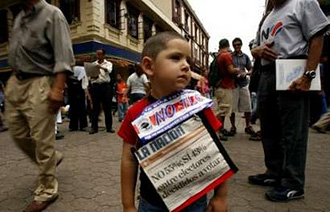 |
 |
 |
 Business News | October 2007 Business News | October 2007  
CAFTA Faces Obstacles as US, Foreign Citizens See Downsides
 Carlos Guerra - San Antonio Express-News Carlos Guerra - San Antonio Express-News
go to original


| | Aron Valverde, 3, wears a sticker reading: "No to free trade agreement" and a headline announcing "no", in the central avenue of San Jose October 4, 2007. Costa Ricans will vote on Sunday in a referendum on ratifying the US-Central American CAFTA free-trade pact. (Reuters/Juan Carlos Ulate) |
Is "free trade" on the wane?

We'll see, but U.S. trade policies face a critical vote Sunday. And polls show the referendum on the Central America Free Trade Agreement in Costa Rica where people get to vote on such things it is likely to be rejected by voters by a whopping 55 percent to 43 percent.

All this started in the mid-1960s, when "twin plants" opened on both sides of the Mexican border to help ease labor shortages that followed the end of the Bracero Program. Instead of temporarily bringing in Mexican workers, U.S. manufacturers could send work there.

The twin plants set off a border boom. And they kicked off a 40-year campaign to selectively dismantle trade barriers to boost corporate profits but that also wound up costing us millions of high-wage U.S. manufacturing jobs.

Along the way, "fast track authority" was increasingly used to negotiate trade agreements. With fast track, White House negotiators hammer out the pacts with other countries without much oversight. Congress then is handed finished pacts that can't be amended for rushed, up-or-down, yes-or-no votes.

Free trade's crown jewel, NAFTA, finally came in 1991 when Canada, the United States and Mexico agreed to successively lower trade barriers as various conditions were met.

It wasn't a pact among equals. Since then, free-trade agreements have been negotiated with other countries. But increasingly, U.S. trade representatives have squeezed concessions out of smaller countries by offering "carrots": U.S. investment and unfettered access to U.S. markets. And, after the agreements are ratified, squeezing greater concessions out of them with "sticks" called "implementing legislation," required changes in small nations' legal systems that almost always increase U.S. corporate profits.

Now in play is CAFTA, a pact with the Dominican Republic, Guatemala, El Salvador, Nicaragua, Honduras and Costa Rica. But the "Ticos" as Costa Ricans call themselves, want to renegotiate or they will pull out of the deal despite U.S. threats.

Of course, Costa Rica is very different from its neighbors.

With only 4.3 million Ticos, it has the smallest population of the nations involved. But it also has been unique in Latin America since 1949, when it disbanded its army and started investing in universal health care, education and state-run public services that are giving Ticos a steadily rising standard of living.

And it shows. The U.N. Food and Agriculture Organization pegs Costa Rica's adult literacy at 94.5 percent, compared to El Salvador's 72.4 percent and Guatemala's 69.1 percent. Ticos' life expectancy is 79 years, not the 68 to 71 years of CAFTA's other signatories.

Good schools and health care also have rewarded Costa Rica with the highest gross domestic product in the region ($9,481 in U.S. dollars per capita), significantly higher than the lowest, $2,876 in Honduras and even the next-highest, El Salvador's $5,041.

Last Sunday, 100,000 Ticos marched against CAFTA's ratification, with many saying it will lead to privatization of essential services especially health care. And then, there was a leaked memo from Vice President Kevin Casas to President Oscar Arνas that outlined a well-funded campaign of fear if Costa Ricans don't ratify CAFTA.

Wonder where they learned such disgraceful tactics?

And dismiss Costa Rica as a nanny state run by leftists, if you like, even though it long has welcomed Americans. But the Ticos may be in the company of some unlikely allies.

A national NBC News/Wall Street Journal poll of U.S. Republicans last week shows growing discontent over U.S. trade policies among conservatives.

Asked if foreign trade has been good for our economy "because demand for U.S. goods resulted in economic growth and jobs for Americans," only 32 percent agreed. Asked if it was "bad because imports have reduced demand for American-made goods (and) cost jobs at home," 59 percent said yes.

And 64 percent said they want "tougher regulation to limit imports of foreign goods."

Imagine that.

To contact Carlos Guerra, call (210) 250-3545 or email cguerra@express-news.net. | 
 | |
 |



